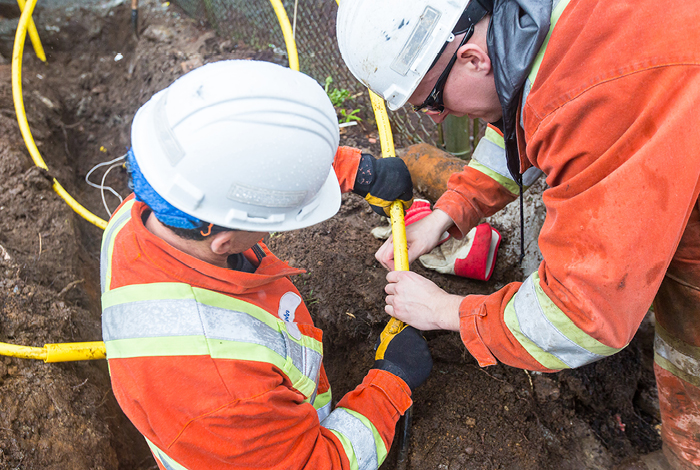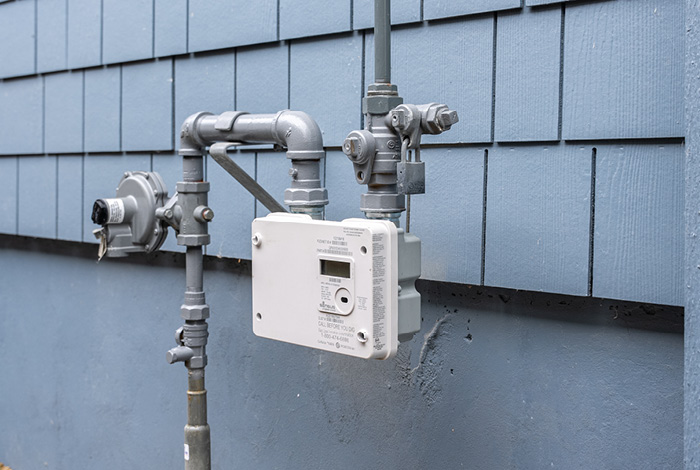We make a big stink when it comes to investigating gas odour
July 6, 2020
Updated: March 4, 2025
Smelling rotten eggs might be a sign of a gas leak. If you smell gas, act fast: stop what you’re doing, go outside and call our 24-hour emergency line at 1-800-663-9911 or dial 911 right away (do not email us or message us on social media for gas emergencies). While gas leaks are uncommon, we investigate reports of them seriously. Learn more about the steps we take to ensure your safety.
Go behind the scenes of our emergency operations
Gas leaks are extremely rare, so sometimes when people smell gas, they don’t realize it’s an emergency.
“Occasionally people email us, which isn’t good as we can’t monitor our inbox constantly if we’re busy. Then again, we get people who call us and say they’ve been smelling gas for the past month,” says Crystal, a FortisBC dispatch coordinator.
If you think you smell gas, either inside or outside your home, or out in public, call us or 911 right away.
Crystal is one of more than a dozen FortisBC dispatch coordinators who, as well as working with our field technicians for day-to-day activities, dispatches emergency responses to incidents like gas odour reports, gas line damages and carbon monoxide.
When we get a report about a gas smell, our goal is to have a field technician at the location within an hour, even if it’s the middle of the night. At FortisBC, safety is important to us. If you smell gas inside or outside, we’ll send someone to check it out right away.

We add trace amounts of mercaptan to our gas system to make gas easily detected. Mercaptan has a strong smell even in very low concentrations and is not hazardous when dispersed into an open atmosphere.
What happens if you smell gas inside your home or business
“If you smell gas inside your home, there’s no charge for one of our technicians to attend and investigate,” says Nicole, an emergency operations representative who handles emergency calls not only for our core business, but also for our liquified natural gas facilities and transportation stations. “Our technicians won’t leave until we determine the source of the odour. We’ll also check to make sure all your gas appliances are operating properly and use a gas odour detector to determine if any of the gas lines inside your home are leaking. If we do find a leak, we’ll mark it and then turn off the gas upstream of the leak,” she adds.
Since we don’t own the gas lines or equipment within a private home or business, we don’t repair them. Once we’ve shut the gas off and determined that it’s safe, we direct the customer to contact a gas contractor licensed with Technical Safety BC to make the repairs. You can find one through our Trade Ally Network.
What happens if you smell gas outside or in a public space
What happens if someone smells gas outside their home, like in the street or by the gas meter?
“If you smell gas near your meter, or anywhere outside, we attend as well,” says Nicole. “In the case of the meter, we’ll determine the source of the leak and repair or replace it. If we detect gas leaking from the service line running from the street to your premises, we’ll send out a construction crew to dig up the line and repair it, and then return your property to its original condition,” she added.

FortisBC construction crew repairing a damaged gas line.
Because meters and service lines belong to FortisBC, there’s no cost to customers to repair them. There’s one exception to this rule: if you hit and damage a gas service line on your property when digging or excavating, you might be liable for repair costs. “Sometimes folks are digging in their yards and hit the gas service line and cover it back up, not realizing they’ve caused a leak,” says Carmel, dispatch coordinator. “Days later they start smelling gas. But there’s an easy way to prevent hitting a gas line and that’s by clicking or calling BC 1 Call first to get underground gas and other utility line location information.”
The other type of gas odour calls we get are what we call ‘atmospheric.’ This could be someone driving or walking by a public area and smelling rotten eggs. “Sometimes we’ll get a flurry of calls from areas near mushroom farms or cow pastures. It depends on the activity at the location, the weather and the wind,” says Maria, dispatch coordinator. “But no matter, we go out to investigate to confirm 100 per cent that it’s not a gas leak.”
When in doubt, we send someone out!
One thing our dispatch coordinators and emergency representatives emphasize is that they want you to call, even if you’re not sure it’s a gas smell. “Perhaps the hesitation is people are unsure if what they’re smelling is gas and they don’t want to tie up resources for a wild goose chase. But we have a saying here: when in doubt, send someone out. We’d much rather have a false alarm than an avoidable accident,” says Nicole.
“We’re here for our customers and we want you to be safe in your home or business. Never hesitate to call our emergency number if you suspect you smell gas. But go outside first and then call us and stay outside until we arrive. If we go to investigate a gas odour call and no one is there, we have to turn the gas off at the meter to ensure the safety of the public.”
An unexpectedly sweet false alarm
We do get a few false alarms. Occasionally the smell turns out to be a dead animal or sewer gas. A few years ago, Nicole says they got several gas odour calls from residents of an apartment building. “Our field technicians attended and chased the smell up and down hallways and finally it was determined that the smell was not a gas leak, but rather a durian,” she quipped. Durians are pungent tropical fruits, often described as smelling like sewer gas and yes, rotten eggs—just like gas!

Durian fruit may also smell like rotten eggs.
What to do if you can’t smell very well
If you have a weak sense of smell, one of the best ways to detect a potential gas leak is to install gas detectors in your home. These detectors have alarms and sensors to help you identify a leak before it becomes dangerous. Other warning signs include:
- hissing or whistling sounds near gas lines or appliances
- physical symptoms such as headaches, dizziness, eye and throat irritation or nausea, which improve when you go outside and breathe fresh air1
- dead or discoloured plants indoors near gas lines2
- a cloud of dust or debris near gas lines3
Here’s what to do if you think you smell gas
Our motto is if you smell or think you smell gas, act fast! And then follow these three steps:
1. Stop what you're doing.
Don't use your cellphone, don’t smoke, light matches or operate electrical switches or create any other source of ignition.
2. Go outside.
As you exit, leave the door open behind you as well as any windows that may already be open.
3. Call us.
Once outside, call the FortisBC emergency line at 1-800-663-9911 (24 hours) or dial 911.
After you call (don’t email), wait outside for help to arrive. If you leave, they’ll have to turn the gas off at the meter, which will be rather inconvenient for you when you come home and find no gas for heat or hot water.
1Does a Gas Leak Cause Physical Symptoms? | healthline.
2Does a Gas Leak Cause Physical Symptoms? | healthline.
3Signs and symptoms of a gas leak | Medical news.



